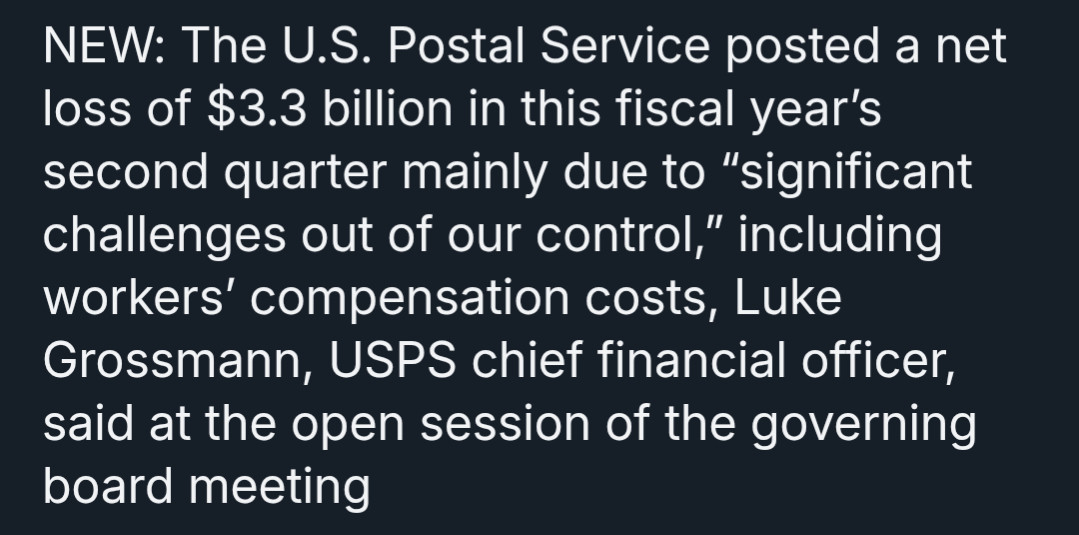We are oddly selective about the government services about which we will say, they operate at a loss.
Commuter rail, we are often told, operates at a loss. But we spend even more on street and highways, and take in little direct revenue from them. Yet no one ever says they are operating at a loss.
Commuter rail, we are often told, operates at a loss. But we spend even more on street and highways, and take in little direct revenue from them. Yet no one ever says they are operating at a loss.

Comments
In 2006, Congress the Postal Accountability and Enhancement Act (PAEA) required the USPS to create a $72 billion fund to pay for the cost of its post-retirement health care costs, 75 years into the future. This burden applies to no other federal agency or private corporation.
We need it.
We do not need it privatized.
UK went too far with privatization with insufficient oversight.
Vehicle tax should be a function of mass x miles = wear and tear cost?
"It's not a bug it's a spoliation."
They exist to provide a service to the populace. These services are funded by that same populace, via taxes.
If these services are underfunded, then perhaps wealthy citizens/corps paying under 10% in taxes should chip in more like the rest of us.
This change in mindset should apply to a lot of other services.
It was a specific attempt to destroy the solvency of USPS so they could justify replacing it with privatized mail service.
Cities justify maintaining streets in terms of dollars created for the local economy. Then, when it comes time to maintain a train, we still use dollars but we totally shift the measure: only revenue.
Or you think we should only measure the nonmonetary value of highways?
/1
/2
However, only governments can (and should) operate at that scale.
WA toll revenue was $209.4 million in 2024.
And this is still the state.
Yes, the USPS "makes a loss." But it also costs the same to send a letter to Barrow, Alaska or Princeville, Hawaii as it does across town. This is by design and a good thing.
They became enamored of the idea, but couldn’t make the hard choices to sustain it.
Others:
Unions
Public education
Student loans
Obamacare/Medicaid
Social Security
I’m saying that all of them are systematically flawed.
Dems would not risk reform, because reform must begin with criticism of the program.
The ground was ripe for this mess.
Feels like these assumptions are built on similar foundations.
We all have a very clear understanding of how the post office and mass transit generate revenue; we all pay them with stamps and subway cards.
So, we have a moderately-high requirement that government software agencies should generate revenue, too.
🥷🏻🥷🏻🥷🏻🇺🇸👑
Stamps should be free!
https://bsky.app/profile/padjen.bsky.social/post/3loub3wgq4c2m
https://docs.google.com/spreadsheets/d/1YqnrCcYLcuiOE8IXD9i81O-ysQEQLqXCUaJKJMtCeh4/edit?usp=sharing
And that was before 18F and all gov software modernization was cancelled "for efficiency."
Yet like 18F, USDS had to justify itself with immediate "cost recoverable" revenue. The money it saved other agencies and the taxpayer wasn't considered good enough.
Insourcing like 18F are more just accounting fictions like you say, sometimes not captured well. Private sector has its own versions of this issue.
But I have taken it down again after listening to the whole thing. Apologies to anyone who got past the first third. It gets very 1970s and pretty fucking grim.
Meanwhile government entities that don't bring in revenue at all (e.g. the military) don't face this scrutiny.
The current "reforms" were forced on it later in 2006 by both Ds and Rs. It's completely ridiculous.